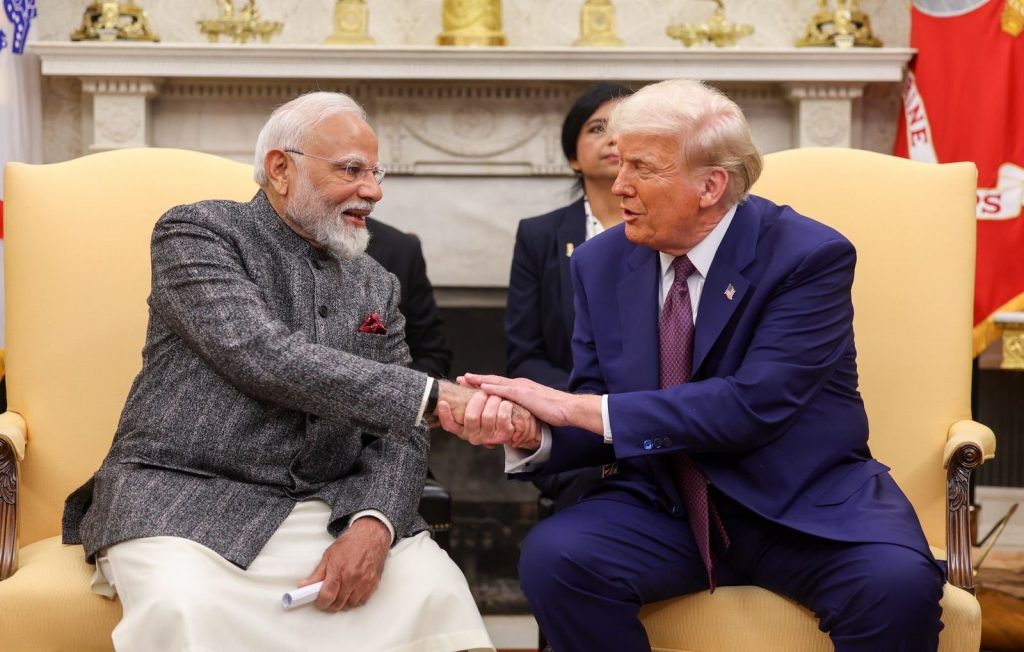US President Donald Trump’s economic policies in his second term have rekindled the debate between protectionism and globalisation. The way Trump has been threatening to impose tariffs is being watched cautiously in India.
Ashwani Mahajan, co-convener of Swadeshi Jagaran Manch (SJM), an organisation inspired by Rashtriya Swayamsevak Sangh (RSS), recently wrote in the latest edition of its monthly journal ‘Swadeshi Patrika’ that Trump’s stand on higher tariffs on imports and plans to abolish income tax would lead to a massive fiscal deficit as the US doesn’t have enough capacity to produce a number of goods that it imports. So higher tariffs would make imports more expensive.
Mahajan further added that higher inflation would compel the US authorities to impose higher interest rates. This could further lead to decline in demand.
The SJM co-convenor has also questioned Trump’s decision to withdraw from Paris Climate agreement. Trump’s decision to give traditional automobile sector over the renewable energy driven automobiles can also have serious repercussions both for the climate change as well as the USA. US would have been beneficiary of the development of climate change technologies but now it won’t be able to harness that advantage, says Mahajan.
Trump administration’s new policies have forced the Indian policy makers also to go for a rethink. Do we need to go back to Swadeshi economics? Perhaps, that is the only way out.
Traditional approach might not help India to wade through the economic minefield with an increasingly volatile geopolitical situation and a protectionist Trump administration.
Trump’s economic agenda is an outcome of the failure of globalisation. A section of Indian economists led by SJM has already been highlighting this fact for the last several years that globalisation creates more problems than solutions for not only the Indian economy but for most of the economies in the world.
Way back in 2017, the SJM had passed a resolution titled ‘Time to End Globalisation’ in its national council meeting at Guwahati. The resolution quoted the statements by its founder and RSS stalwart DattopantThengadi, “Internationalisation is merely a momentarily stable phase and the nation alone is stable.”
Recognising that the days of aggressive globalisation are over and that the possibilities in international trade are weakening, India will now have to take meaningful steps, the resolution said.
It further added, “The Swadeshi Jagaran Manch appreciates the nationalistic sentiment of the present (Modi) government in giving primacy to government purchases of domestically produced commodities. But the time has come now for the government to promote domestic investment instead of encouraging foreign direct investment.”
The SJM has consistently kept a stand that India’s large domestic demand provides a significant opportunity. That is why, instead of providing opportunities to multinational companies to profit, an economic model based upon domestic demand should be constructed. This stand was reiterated in the 2017 resolution and the SJM has vocally batted for it since then.
The RSS also passed a resolution in 2022 which said, “…. Thrust is to be given to Bharatiya economic model that is human centric, labour intensive, eco-friendly and lays stress on decentralization and equitable distribution of benefits and augments village economy, micro scale, small scale and agro-based industries. The areas like rural employability, unorganized sector employment, employment to women and their overall participation in the economy need to be boosted. Efforts are essential to adapt new technologies and soft skills appropriate to our societal conditions.”
Both the RSS and its ideological mentee SJM have shown a great concern about employment generation which remains a major challenge for the Indian economy.
The RSS laid a broad roadmap for creating more jobs without getting affected by either globalisation or protectionism in its 2022 resolution where it said, “It is noteworthy that there are many successful models of employment generation based on the above lines available in every part of the country. They have also taken into account local specialities, talent and requirements. At many such places, entrepreneurs, businessmen, micro finance institutions, self-help groups and voluntary organizations have initiated endeavours in the areas of value-added products, cooperative sector, direct marketing of local products and skill development etc. These initiatives have encouraged ventures such as handicrafts, food processing, homemade products and family enterprises. After sharing their experience with others, replicating them at places wherever required should be earnestly considered. Certain educational and industrial institutions have contributed in employment generation efforts in a significant way…. Efforts to inculcate the spirit of ‘Swadeshi and self-reliance’ in the society would give the right impetus to the above initiatives.”
The RSS and SJM both have said earlier also and continue to maintain their stand that neither globalisation, nor protectionism can pave a brighter future for the Indian economy. What we need is a ‘Third Way’ based on the philosophy of ‘Swadeshi’ and the ideological framework of ‘Integral Humanism’. The current global geopolitical crisis and the unorthodox approach of Trump 2.0 makes it necessary for India to find a new way to deal with its economic challenges. Maybe ‘Third Way’ is the right way.
(The article was first published in www.moneycontrol.com. Link: https://www.moneycontrol.com/news/opinion/india-needs-a-third-way-to-deal-with-new-economic-challenges-12942608.html)
